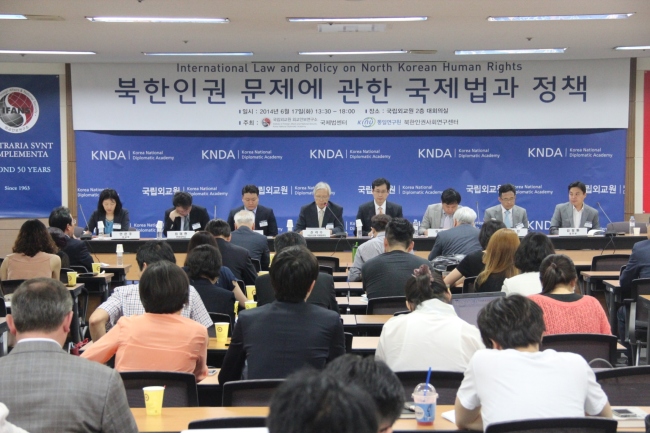Seoul should take on a greater role in addressing North Korea’s unbridled violations of human rights to help pile pressure on the communist regime and better prepare for future unification, experts said Tuesday.
Dozens of policymakers and scholars in law and international politics gathered in Seoul to discuss ways to address rampant rights breaches in the reclusive country at home and on the world stage. The one-day seminar was hosted by the Center for International Law at the state-run Korea National Diplomatic Academy.
Though a referral to the International Criminal Court is difficult in practice, participants raised the need for the international community to maintain pressure in the wake of a recent U.N. report.
The landmark paper by the Commission of Inquiry detailed “systematic, widespread and gross” human rights violations in North Korea that constitute crimes against humanity, calling for the offenders including its leader Kim Jong-un to be brought to an international criminal justice mechanism.
Dozens of policymakers and scholars in law and international politics gathered in Seoul to discuss ways to address rampant rights breaches in the reclusive country at home and on the world stage. The one-day seminar was hosted by the Center for International Law at the state-run Korea National Diplomatic Academy.
Though a referral to the International Criminal Court is difficult in practice, participants raised the need for the international community to maintain pressure in the wake of a recent U.N. report.
The landmark paper by the Commission of Inquiry detailed “systematic, widespread and gross” human rights violations in North Korea that constitute crimes against humanity, calling for the offenders including its leader Kim Jong-un to be brought to an international criminal justice mechanism.

“The existence of the possibility of a referral serves as a deterrence itself, and in the long term we can secure accountability,” said Ahn Eun-ju, director for treaties at the Foreign Ministry.
“There was a myriad of U.N. Security Council resolutions before ad hoc tribunals were set up for previous cases, but not so many for North Korea human rights. It’s imperative not to lose momentum ― it will be a long journey.”
An ad hoc tribunal is deemed a more realistic option as Pyongyang is not a signatory of the treaty that created the ICC, while China would almost certainly veto any referral to The Hague.
The special court may be established by a majority vote at the General Assembly.
Scholars also urged Seoul officials and politicians to take a more active stance, including passing long-pending legislation on North Korean human rights to make way for the establishment of a database for abuse cases.
Lawmakers, mostly of the conservative ruling Saenuri Party, have proposed the bill since 2005. But it struggled to pass a standing committee in the face of progressives’ concerns that it may rile Pyongyang and freeze cross-border relations.
“The law may look hostile to Pyongyang but we need to be more active about this as a means to realize universal values,” said Je Sung-ho, a law professor at Chung-Ang University who helped a lawmaker propose the 2005 bill.
“Despite the fierce resistance of the opposition camp, we need the legislation for our own future ― be it for liquidating the past, investigating abductees in the North or punishing the perpetrators. We can do it after unification, but only if we begin now.”
The U.S. has extended its North Korean Human Rights Act since 2004 to ensure refugee protection, humanitarian assistance and the promotion of democracy. Its 2012 edition added a new clause urging China to stop repatriating North Korean defectors.
The European Union has also passed related resolutions for seven straight years since 2005. Japan enacted similar legislation in 2004 and 2006.
“South Korea is now in a position to take the lead on human rights in North Korea and Asia as a whole and ought to multiply related efforts,” said Shin Kak-soo, the center’s president and an international law expert who served as vice foreign minister and ambassador to Japan.
Kim Jeong-hwan, a public prosecutor at the Justice Ministry in charge of North Korea-related legal affairs, pinned high hopes on an envisioned human rights archive, as well as a field office to be opened soon here by a U.N. rights agency to monitor and study the situation across the border.
“Clearly there are also limits in terms of the international community’s efforts unless an internal collapse or other disruption of the system comes about, but the field office will help improve human rights in North Korea as a regional base to keep the regime in check,” Kim noted.
“We, for our part, need to think about what responsibilities we have to the North Korean people, and I believe that our own efforts will bring a more direct, effective impact than others’.
“The database will mean a warning to Pyongyang against future abuses. There is no more immediately effective way than pressure to improve the grave situation.”
By Shin Hyon-hee (heeshin@heraldcorp.com)









![[Hello India] Hyundai Motor vows to boost 'clean mobility' in India](http://res.heraldm.com/phpwas/restmb_idxmake.php?idx=644&simg=/content/image/2024/04/25/20240425050672_0.jpg&u=)









